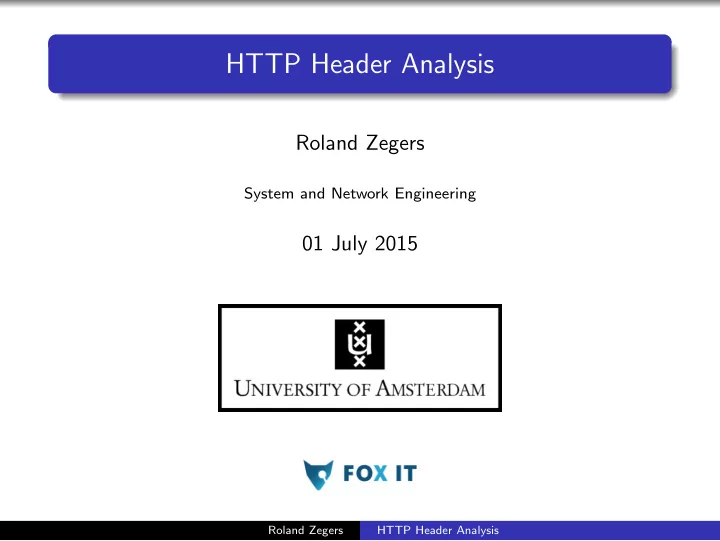

HTTP Header Analysis Roland Zegers System and Network Engineering 01 July 2015 Roland Zegers HTTP Header Analysis
Introduction HTTP: used for communication of webtraffic Headers provide information about the source system, the software and the content that is transferred. HTTP communication also extensively used by malware. Exploit Kits: launch platform, easy to use, much options Roland Zegers HTTP Header Analysis
Research questions Is it possible to determine from which source certain HTTP traffic comes, when analyzing and correlating the HTTP header ordering? Is it possible to create reliable fingerprints from the analysed results? Is it possible to determine if malware is present by analyzing outliers in the HTTP header ordering? Can fingerprints be created that match on the outliers? Roland Zegers HTTP Header Analysis
HTTP header structure Figure: HTTP header structure Roland Zegers HTTP Header Analysis
Method Retrieve header order from pcap files from uninfected systems Get header order from infections Overlay infection headers over uninfected systems Calculate probability, uncertainty and occurrence of header order before and after infection Match results with unknown samples from Fox-IT Roland Zegers HTTP Header Analysis
Approach 1 Parse HTTP traffic from pcap to .json format 2 Structure the format 3 split into separate flows 4 split into separate request headers (strip other headers) 5 Strip content of Cookie, URI an Referer headers 6 Add linenumbers 7 Count linenumbers of headers for further calculations "ua": "Mozilla5.0 (Windows NT 6.3; WOW64; Trident7.0; rv:11.0) Roland Zegers HTTP Header Analysis
Results Figure: HTTP header order Roland Zegers HTTP Header Analysis
Results - Entropy calculation Used Shannon’s entropy theory to calculate and compare the header position uncertainty of uninfected and infected systems. Shannon’s Entropy Theory n � H ( X ) = − p i log 2 ( p i ) i =1 Systems Entropy before infection Entropy after infection PC1 4,07 4,95 PC2 4,00 4,87 PC3 4,19 4,73 Roland Zegers HTTP Header Analysis
Results - Fox-IT systems Roland Zegers HTTP Header Analysis
Results - example Figure: Uninfected headers Roland Zegers HTTP Header Analysis
Results - example Figure: Infected headers (Fiesta Exploit Kit) Roland Zegers HTTP Header Analysis
Conclusion From the header order, profiles (and thus fingerprints) can be created for individual systems No distinction between similar systems: cloned systems will have about the same fingerprint Some malware will have a distinct profile that can be fingerprinted (Re-)Calculating entropy levels can indicate an infection Results probably less obvious when using worst-case systems (systems with lots of user-agents or malware with a low disturbance profile) Roland Zegers HTTP Header Analysis
Future work Testing on a larger scale, incorporating worst-case systems and infections Developing a automated header order fingerprinting program Roland Zegers HTTP Header Analysis
End Thank you for your attention! Questions? Roland Zegers HTTP Header Analysis
Recommend
More recommend